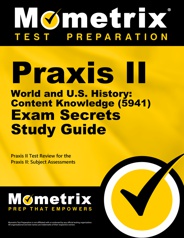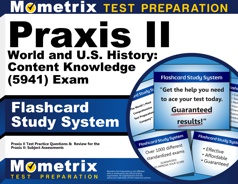The Praxis World and US History Content Knowledge exam is used by many states to assess an individual’s knowledge and skill to effectively teach world and United States history at the secondary level.
Click “Start Test” above to take a free Praxis World and US History practice test!
Exam Outline
The Praxis (5941) exam contains 120 selected-response questions and has a time limit of 2 hours.
Most of the questions assess your knowledge of historical processes and facts, while 25% of the questions focus on historical thinking skills, such as evaluating sources, formulating historical questions, and supporting historical arguments.
The exam is split into four content categories, which are designed to cover the various competencies and points of knowledge that a secondary school history teacher should possess.
I. World History to 1450 CE (30 questions)
The questions in this category assess your knowledge of the following:
- How human history has been shaped by global environmental and climatic factors
- The origin, development, and spread of Judaism, Hinduism, Islam, Confucianism, Christianity, and Buddhism
- Early river valley civilizations in Afro-Eurasia from 8000 to 1000 BCE
- Early river valley civilizations in Mesoamerica and South America from 2000 BCE to 1500 CE
- The collapses of empires from 200 to 600 CE
- Structures and characteristics of hunter-gatherer societies
- The shift that occurred with the Neolithic Revolution circa 8000 BCE
- The emergence and effects of interregional networks from 1000 to 1450 CE
- The formation of new empires and political systems from 600 to 1450 CE
- How political, economic, and social systems from 600 to 1450 CE were affected by the spread of Islam
II. World History: 1450 CE to the Present (30 questions)
The questions in this category assess your knowledge of the following:
- The main characteristics of the East African, trans-Saharan, and Atlantic slave trade (1400-1880) and their cultural and economic effects
- The political, cultural, and economic changes in the Middle East in the 20th century
- Major 20th-century genocides
- Characteristics of the Renaissance, Scientific Revolution, Enlightenment, and Reformation
- The development of major political entities across the world from 1450 to 1750 CE
- The development and policies of 20th-century totalitarian states
- The emergence of new human rights and political movements from 1945 to the present
- The main causes, major events, and effects of World War I and World War II
- European exploration and colonization from 1450 to 1750 CE
- The causes major events, and effects of the Industrial Revolution
- African and Asian decolonization and nationalist movements from the 1890s to the 1990s
- Western nationalism, colonization, and imperialism from 1840 to 1945
- Political revolutions, unifications, and independence movements from 1750 to 1914
- The changing roles of women across the world since the 19th century
- The main causes, major events, and global effects of the Cold War from 1945 to 1989
- The collapse of communism in Europe
- The breakup of the Soviet Union
- Global economic and technological changes in the late 20th and early 21st centuries
III. United States History to 1877 (30 questions)
The questions in this category assess your knowledge of the following:
- Territorial expansion of the United States in the 19th century
- Major causes and events of the American Revolution
- North American geography, cultures, and peoples prior to European colonization
- Relationships among Africans, Europeans, and American Indians during the colonial period
- Major political developments in the United States from the 1790s to the Civil War
- The causes and effects of religious and reform movements in the antebellum United States
- The effects of slavery in the British American colonies and the United States
- The growth of 19th century sectionalism
- History of the Civil War and Reconstruction
- The origins of the Civil War
- The successes and failures of the Articles of Confederation
- The writing and adoption of the US Constitution and Bill of Rights
- Regional differences in social structures in Colonial America
- The emergence and development of the market economy
- How the development of North American colonies was shaped by European imperial and political conflicts, as well as indigenous interests
- The reasons European colonies were founded in North America and how they were developed
IV. United States History: 1877 to the Present (30 questions)
The questions in this category assess your knowledge of the following:
- The origins, major events, and effects of United States participation in World War I
- The contrast of rural and urban development in the United States in the late 19th and early 30th centuries
- The causes and effects of the Great Depression
- Regional developments in the late 19th and early 20th centuries
- Major social policy initiatives and political movements in the United States since World War II
- Economic, political, technological, and social changes in the late 20th and early 21st centuries in the United States
- The civil rights movements of African Americans and other groups
- How the development of the United States was affected by immigration, industrialization, and urbanization in the 19th and early 20th centuries
- Changes resulting from the Gilded Age and Progressive Era reforms
- The causes and effects of immigration and internal migration in the 20th and 21st centuries
- The origins, developments, and effects of the Cold War
- The programs and goals of the New Deal
- The changing role of the United States after the Cold War
- Social changes from the 1940s to the 1970s
- The political, economic, cultural, and social changes in the 1920s
- The woman suffrage movement
- The global patterns and effects of United States imperialism in the late 19th and early 20th centuries
Check Out Mometrix's Praxis World and U.S. History: Content Knowledge (5941) Study Guide
Get practice questions, video tutorials, and detailed study lessons
Get Your Study Guide
Registration
To register for the Praxis World and US History exam, you will need to create an online account with ETS. Through this account, you can submit an application to take the exam.
During registration, you will be asked to select the test-taking format (remote or at a testing center), test location (if you are taking the test at a testing center), and test date. You will also need to pay the $130 exam fee.
An admission ticket is emailed to you after you register. Your test date, time, and location are listed on the ticket. Confirm the information and print the ticket so you have it available when it’s time for you to check in. Testing facility staff may ask for the printed ticket.
Test Day
You should arrive 30 minutes before your scheduled appointment so that you have time to complete the required paperwork at check-in. Leave all unnecessary personal belongings in your vehicle and only take with you the required identification and admission ticket.
After you complete the check-in process, the test center staff will escort you to your station. All materials needed for the exam are provided, and you will return all supplies at the conclusion of your exam. Before the time starts for your test, a practice tutorial is available to familiarize yourself with the delivery method.
Your time will start once you finish the tutorial. Breaks are not included in your testing period.
How the Exam is Scored
Your Praxis World And US History exam score is based on the number of questions you answer correctly, which is known as your raw score. To determine your final score, this raw score is converted to a scaled score. The scaled score you need to obtain differs slightly depending on which state you take the exam in.
You should receive an official score report about five weeks after testing.
Check Out Mometrix's Praxis World and U.S. History: Content Knowledge (5941) Flashcards
Get complex subjects broken down into easily understandable concepts
Get Your Flashcards
FAQs
Q
How many questions are on the Praxis World and US History Content Knowledge exam?
A
There are 120 selected-response questions on the exam.
Q
How long is the Praxis World and US History Content Knowledge exam?
A
The time limit for the exam is 2 hours.
Q
What is the passing score for the Praxis World and US History Content Knowledge exam?
A
The score you need to pass the exam differs depending on which state you take the exam in.
Q
How much does the Praxis World and US History Content Knowledge exam cost?
A
The examination fee is $130.

